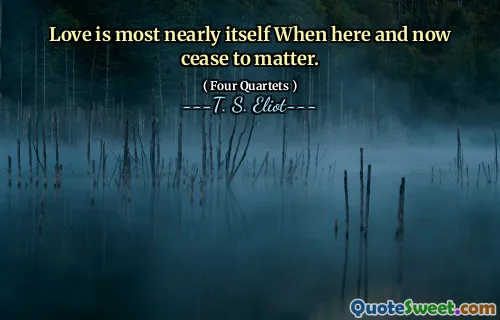T.S. Eliot was a prominent 20th-century poet, playwright, and literary critic, known for his innovative approach to modernist literature. His seminal works, such as "The Waste Land" and "The Love Song of J. Alfred Prufrock," explore themes of disillusionment and fragmentation in the post-war world. Eliot's poetry often reflects his fascination with time, memory, and religious faith, revealing his complex views on modern existence. Eliot's influence extended beyond poetry; he was also a significant figure in theater and criticism. His plays, like "Murder in the Cathedral," delve into moral and spiritual dilemmas, expanding his exploration of human experience. As a critic, he emphasized the importance of tradition and the interconnectedness of literary works, shaping the understanding of modern literature. In addition to his literary contributions, T.S. Eliot received the Nobel Prize in Literature in 1948, acknowledging his profound impact on poetry and drama. His work continues to resonate, offering insights into the human condition and the challenges of modern life, solidifying his legacy as one of the greatest writers of the 20th century.
T.S. Eliot was a prominent 20th-century poet, playwright, and literary critic known for his innovative approach to modernist literature. His seminal works, such as "The Waste Land" and "The Love Song of J. Alfred Prufrock," explore themes of disillusionment and fragmentation in the post-war world. Eliot's poetry often reflects his fascination with time, memory, and religious faith, revealing his complex views on modern existence.
Eliot's influence extended beyond poetry; he was also a significant figure in theater and criticism. His plays, like "Murder in the Cathedral," delve into moral and spiritual dilemmas, expanding his exploration of human experience. As a critic, he emphasized the importance of tradition and the interconnectedness of literary works, shaping the understanding of modern literature.
In addition to his literary contributions, T.S. Eliot received the Nobel Prize in Literature in 1948, acknowledging his profound impact on poetry and drama. His work continues to resonate, offering insights into the human condition and the challenges of modern life, solidifying his legacy as one of the greatest writers of the 20th century.
More »
Today Birthdays
1955 -
Max Lucado
1946 -
John Piper
1842 -
William James
1907 -
Abraham Joshua Heschel
1887 -
Aldo Leopold
1755 -
Alexander Hamilton
1976 -
Alethea Kontis
1971 -
Mary J. Blige
1825 -
Bayard Taylor
1943 -
Jim Hightower
1885 -
Alice Paul
1923 -
Carroll Shelby
1928 -
David L. Wolper
1954 -
Kailash Satyarthi
1972 -
Amanda Peet
1946 -
Naomi Judd
1970 -
Malcolm D. Lee
1955 -
Christian Marclay
1973 -
Rahul Dravid
1987 -
Jamie Vardy
1942 -
Clarence Clemons
1992 -
Fatima Sana Shaikh
1948 -
Larry Harvey
1930 -
Rod Taylor



